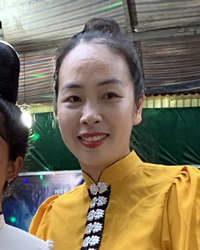Tai Dam in Vietnam

Photo Source:
Anonymous
|
Send Joshua Project a map of this people group.
|
| People Name: | Tai Dam |
| Country: | Vietnam |
| 10/40 Window: | Yes |
| Population: | 871,000 |
| World Population: | 949,500 |
| Primary Language: | Tai Dam |
| Primary Religion: | Ethnic Religions |
| Christian Adherents: | 0.17 % |
| Evangelicals: | 0.14 % |
| Scripture: | New Testament |
| Ministry Resources: | Yes |
| Jesus Film: | Yes |
| Audio Recordings: | Yes |
| People Cluster: | Tai |
| Affinity Bloc: | Southeast Asian Peoples |
| Progress Level: |
|
Introduction / History
The Black Tai (AKA, Tai Dam) live along the banks of the Red and Black Rivers in northern Vietnam. Some have moved south and are now settled mainly in Tung Nghia, Tho Thanh, and Pleiku. Their tonal language, Tai Dam, belongs to a larger cultural-linguistic grouping of people known as the Tai. The Tai peoples include the Laotians, the Shans and others. The Black Tai (Tai Dam) are named for the color of the women's clothing. Eat Tai group has a distinct writing system.
From China, the Tai emigrated south due to unending pressure by the Chinese. In 1895, the French ruled Vietnam in what became a joint rule with Japan for a short period after 1941. The Tai Dam has strong ethnic pride and is part of the official Tai nationality in Vietnam.
What Are Their Lives Like?
The Tai Dam are unusually polite, respectful and hospitable. Children are taught from a young age to accept a code of social behavior based on respect for those who rank higher, emphasizing independence and self-reliance. They generally live at higher altitudes and are less "Vietnamese" and more energetic than the White Tai. They are sympathetic and humorous, seeking any opportunity for feasting.
Their society is organized on the basis of age, occupation, wealth and residence. Within this hierarchy, farmers have a place below the craftsmen, merchants and city government officials, and the clergy are a separate group. The family is the basic unit of their society. Unlike most Asian groups, the Black Tai do not generally live in extended families.
Their spacious houses are artistically designed and built on stilts with bamboo or wooden walls. The tortoise shell-shaped roofs of their bamboo houses distinguish them from the White Tai's rectangular roofs. Their houses are clean and orderly, and the villages are usually surrounded by bamboo fences.
The Tai Dam are a patriarchal society, which means that the oldest male is the head of the tribe. Within Tai families, husbands and wives generally live in harmony, and there is almost no division of labor by sex. Both the women and men plow, hoe, fish, cook, tend babies, clean house and wash clothes. The men are known to be lazy, however, and the women do most of the work, often chewing leaves of the betel palm as a stimulant. The women excel in weaving arts.
The farming of wet rice dominates Tai Dam economy They grow it for their own consumption and to sell to others. Some Tai Dam are engaged in small-scale industrialization.
The spread of small pox, cholera, tuberculosis and malaria was rampant, but they have been brought under control by better medical schools and hospitals.
What Are Their Beliefs?
Their religion is Christianity, usually Roman Catholicism. They commonly incorporate pre-Christian beliefs into the church. Some believe in traditional healers/herdsmen called "Albularyo" who heal them from their illnesses. Many also believe in mythical creatures like aswang, multo and maligno.PRGRPHThere is also a strong Bible-believing element among Tagalogs.
What Are Their Needs?
The Filipino government tries to help its people obtain jobs in other parts of the world, and this has allowed billions of dollars to come back to the Philippines from overseas workers. However, this needs to be balanced with worker rights; the needs of f
Prayer Points
Pray for a movement to Jesus Christ that will result in church plants and discipleship.
Ask the Lord to call people who are willing to share Christ with the Tai Dam.
Ask God to strengthen, encourage, and protect the small number of Tai Dam Christians.
Ask the Holy Spirit to give Tai Dam leaders a spiritual hunger that will affect all others.
Ask the Lord to raise up a strong local church among the Tai Dam.